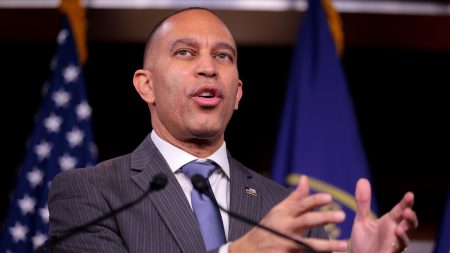A Foreign Service Officer’s Plea: The Human Toll of the USAID Shutdown
The Shutdown and Its Impact
A U.S. foreign service officer, identified only as Terry Doe, has come forward with a harrowing account of how the Trump administration’s abrupt shutdown of USAID has placed his pregnant wife and unborn child in a life-threatening situation. In court documents filed on Monday night, Doe vividly described how the emotional strain, financial burden, and logistical challenges caused by the administration’s rushed and chaotic dismantling of the aid agency have created a dire emergency for his family.
A Desperate Situation
Doe’s wife, who is 31 weeks pregnant, has faced significant health challenges due to the stress and uncertainty caused by the shutdown. After years of infertility and a personal investment of $50,000 in fertility treatments, the couple was finally expecting a child. However, the constant pressure from their employer has led to repeated hospitalizations for life-threatening conditions and stress-related complications. Despite recommendations from both a local physician and the embassy’s medical unit for a medical evacuation, the State Department denied their request twice, citing a lack of USAID funding for medivacs.
A Senator’s Intervention
The situation took a critical turn when an unidentified U.S. senator intervened on the family’s behalf, securing approval for the evacuation. However, by that point, Doe’s wife had already begun hemorrhaging and was hospitalized overseas. As of Monday, she remained in the hospital, and Doe expressed his deep concern for her and their unborn child’s health. He emphasized that the deteriorating medical condition of his wife was directly linked to the stress caused by the shutdown, calling the situation a “life-threatening emergency” that could have been avoided.
A Union’s Pushback
In a separate affidavit, Randall Chester, the vice president of a union representing thousands of foreign service officers, challenged claims made by Peter Marocco, the acting deputy director of USAID. Chester disputed Marocco’s characterization of the evacuation of USAID employees from the Democratic Republic of the Congo (DRC) as a “success,” asserting that the agency had failed to provide the necessary logistical and financial support to evacuees. According to Chester, the evacuation process was poorly managed, leaving many employees without the resources they would normally receive during such operations.
Financial Hardship and Administrative Failures
Chester also highlighted the ongoing issues with USAID’s payment system, known as Phoenix, which remains inoperable. This has left some foreign service officers who were evacuated from the DRC with thousands of dollars in debt, as the agency has not reimbursed them for travel, hotels, and meals during the evacuation. These financial hardships have added to the already significant stress and uncertainty faced by USAID employees and their families.
The Human Cost of a Hasty Shutdown
The affidavits filed by Terry Doe and Randall Chester paint a troubling picture of the human cost of the Trump administration’s rushed and poorly executed shutdown of USAID. The stories of Doe’s wife and the families of foreign service officers evacuated from the DRC underscore the real-life consequences of bureaucratic failures and the importance of ensuring that government actions prioritize the well-being and safety of those affected. As the situation continues to unfold, it remains to be seen how the administration will respond to these allegations and whether measures will be taken to address the harm already done.















